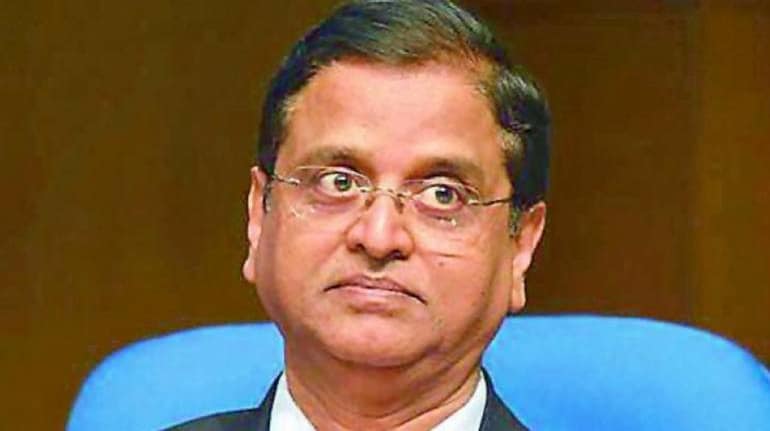



Former Finance Secretary, Subhash Chandra Garg, has said that he would have had no hesitation in transferring the surplus accumulated by the Reserve Bank of India (RBI) to the government had he been named the central bank governor following Urjit Patel's resignation in December 2018. Speaking to Moneycontrol following the release of his new book, 'We Also Make Policy', Garg said his views on the matter of the RBI's capital would not have changed if, in the hypothetical situation, he had been chosen to head the RBI.
"I have no hesitation at all (in saying) that a decision which I would take is to sort of institute a system of transferring the surplus to the government. I don't think the institution will be able to change this. Since it is a hypothetical question, I can only say this much," Garg told Moneycontrol.
In 'We Also Make Policy', released on October 1, Garg wrote that he, along with Shaktikanta Das, were the "two serious contenders" for the RBI governor's job after Urjit Patel's shock resignation on December 10, 2018. Called to the Cabinet Secretariat that same evening to participate in the meeting of the search-cum-selection committee to appoint Patel's successor, Garg wrote that his name for the top job was proposed by economist Rathin Roy, who was also present. Two days later, on December 12, Das was named the 25th governor of the Indian central bank.
"I was told later that Prime Minister Modi was not in favour of letting me leave the government at that juncture," Garg wrote in his book, even as he admitted that given his leading role in the tussle with the RBI, he was "quite likely to be persona non grata for RBI management and staff".
Also Read: Garg says Sitharaman had pre-conceived notions about himLess than a year later, in July 2019, Garg was transferred to the Power Ministry and he exited the government altogether three months later, after choosing to retire a year early.
Steadfast in his viewsGarg's exit from the Finance Ministry in July 2019 was precipitated by his views on the RBI's Economic Capital Framework (ECF) and surplus distribution policy, which decide the amount of surplus the central bank must transfer to the central government every year. With the issue not finding a resolution at the RBI board level, it was decided in the final few weeks of Patel's governorship that an expert committee would be constituted to review the ECF.
One of the six members on the Bimal Jalan-led committee, Garg very quickly found himself in the minority, with four members favouring the RBI's view that it was not carrying any excess reserves. However, Garg said even his attempts to add a dissent note were blocked and led to his eventual transfer.
"RBI does not need – and I am making this statement very responsibly – RBI does not need to retain even a single rupee of the surplus for its monetary policy functions or even financial stability functions," Garg said.
The expert committee was constituted on December 26, 2018. It submitted its report to Governor Shaktikanta Das on August 14, 2019. On August 26, 2019, the RBI's Central Board of Directors approved the transfer of Rs 1.76 lakh crore to the government, including Rs 52,637 crore of excess provisions as per the revised ECF recommended by the Jalan committee.
Also Read: How RBI's dividend gives Centre a much-needed helping handWhen asked whether becoming the RBI governor would have changed him and his opinion, Garg said that while he doesn't bother with hypotheticals, he didn't think becoming a part of the institution would have made him favour it in this matter.
"Despite the fact that we belong to the IAS (Indian Administrative Service) and we don't owe loyalty to any particular discipline, none of us can claim to know the entire thing or the nuances or the depths of the issues of all the places where we work. It so happens that for many people, when they go to a different place, that is the first time they come to know of the real dimensions of the issues over there. And that may make them change their opinion," Garg said.
However, he added that given that he had worked both at the Centre and state level and in finance as well as expenditure departments, he had developed a "wider view about the government".
"I don't recall many instances of my proposals being sent from the expenditure department being rejected by others or changed. So if I were to go to RBI, for example, I have no hesitation at all that a decision which I would take is to sort of institute a system of transferring the surplus to the government. I don't think the institution will be able to change this."
Discover the latest Business News, Sensex, and Nifty updates. Obtain Personal Finance insights, tax queries, and expert opinions on Moneycontrol or download the Moneycontrol App to stay updated!
Find the best of Al News in one place, specially curated for you every weekend.
Stay on top of the latest tech trends and biggest startup news.